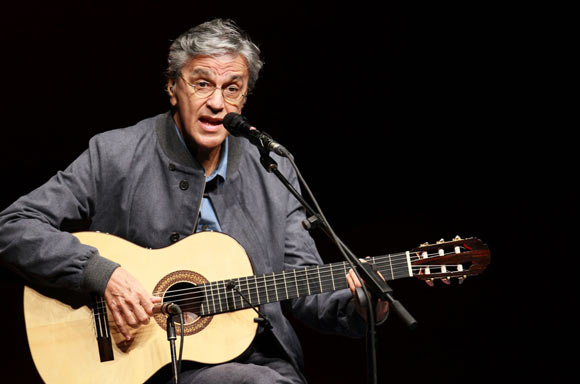
Caetano Veloso is a Brazilian Singer, Guitarist, and Political Activist. He is most known for being one of the founding members of the Brazilian Artistic Movement in the 1960’s, which was locally known as Tropicalismo.
Caetano Emanuel Viana Telles Veloso was born on the 7th of August, 1942 in Bahia Brazil. He was the fifth child of Jose’ Teles Voloso, who eventually fathered seven children. As a child, he was greatly inspired by the bossa nova style that was mastered by Antonio Carlos Jobim and João Gilberto, the latter he would name his ‘supreme master’ later in his career. When Veloso turned twenty three years old, he moved to Rio de Janeiro with his sister, who was an amateur vocalist herself. Veloso then joined ‘Philips Records’ upon winning a competition for his song titled ‘Um Dia’. There, Veloso met esteemed musicians such as Gilberto Gil, Tom Zé, Os Mutantes, and Gal Costa. Together with these musicians, Veloso became one of the founding members of Tropicalismo. The music of Tropicalismo was received as the new wave of Brazilian music, and according to music enthusiast John Dougan, Tropicalismo music retained the art of bossa nova, while it added elements of “folk-art and art rock to a stew of loud electric guitars”. Veloso garnered plenty of attention because of Tropicalismo, mainly because most of his music during the period focused on political awareness, and in opposition to the right wing Brazilian Military Government. This attention hampered Veloso’s music for a time, as the Brazilian Government imprisoned him and his counterpart Gil Gilberto for months at a time, and exiled them in 1968. Only in 1972 were the duo allowed to re-enter the country.
Caetano Veloso’s exile made the news and attracted plenty of attention in music circles. This helped Veloso’s popularity in foreign countries as far as Israel and Greece. Veloso then released an album in the United States titled ‘Estrangeiro’, and in 1993, Veloso teamed up with Gilberto again to produce ‘Tropicalia 2’. The album was known for being highly charged about sociopolitical issues in Brazil, particularly about racism, poverty, and disease. Veloso’s dedication and commitment towards these issues were remarkable; he dedicated two albums and two singles to the Red Hot Organization that were aimed towards the generation of funds to eradicate the AIDS that was heavily prevalent in his home country.
His immense worldwide popularity could be gauged by the fact that he was the center of three sell-out performances at the Public Theatre in New York in 1983 despite his albums having almost negligible presence at United States record stores.
Caetano Veloso released 32 studio albums in all; about 27 of them were released after 1969. His 2004 album ‘A Foreign Sound’ reached number 2 in the Billboard World Hot 100 ratings. Veloso also won two Grammies for Best World Music Album in 1999 for ‘Jo’ and in 2000 for ‘Livro’. He was also the recipient of nine Latin Grammies.